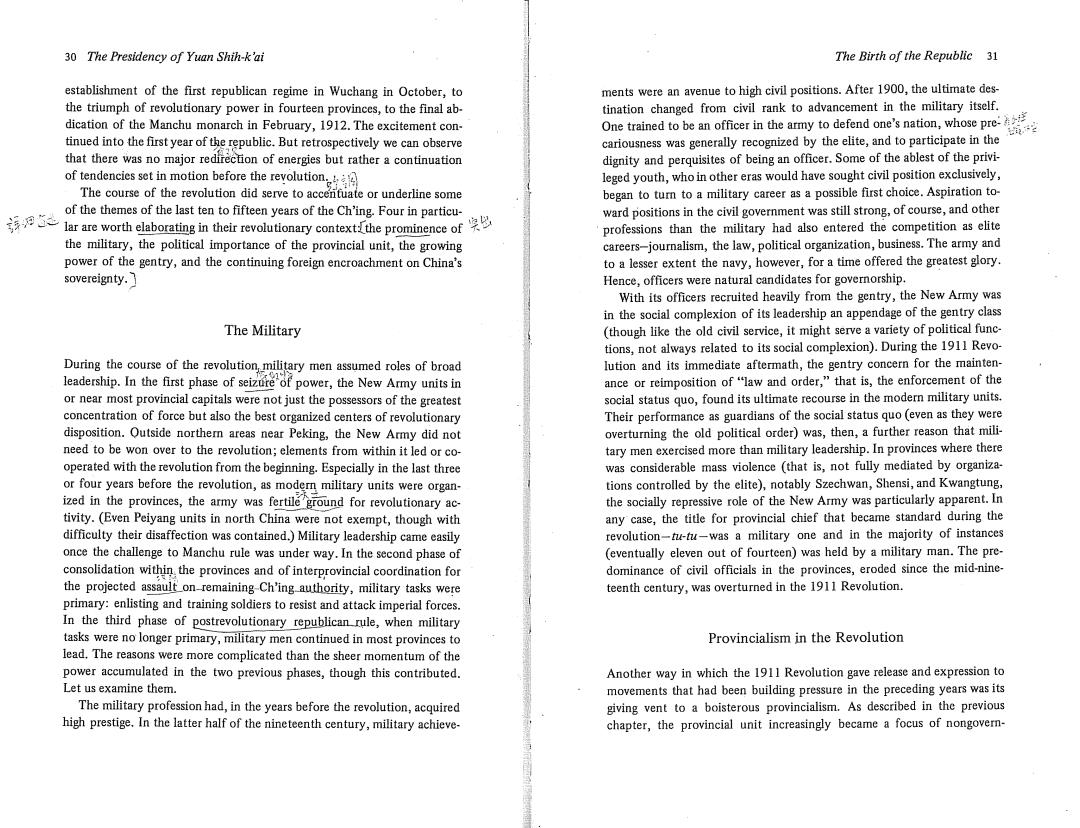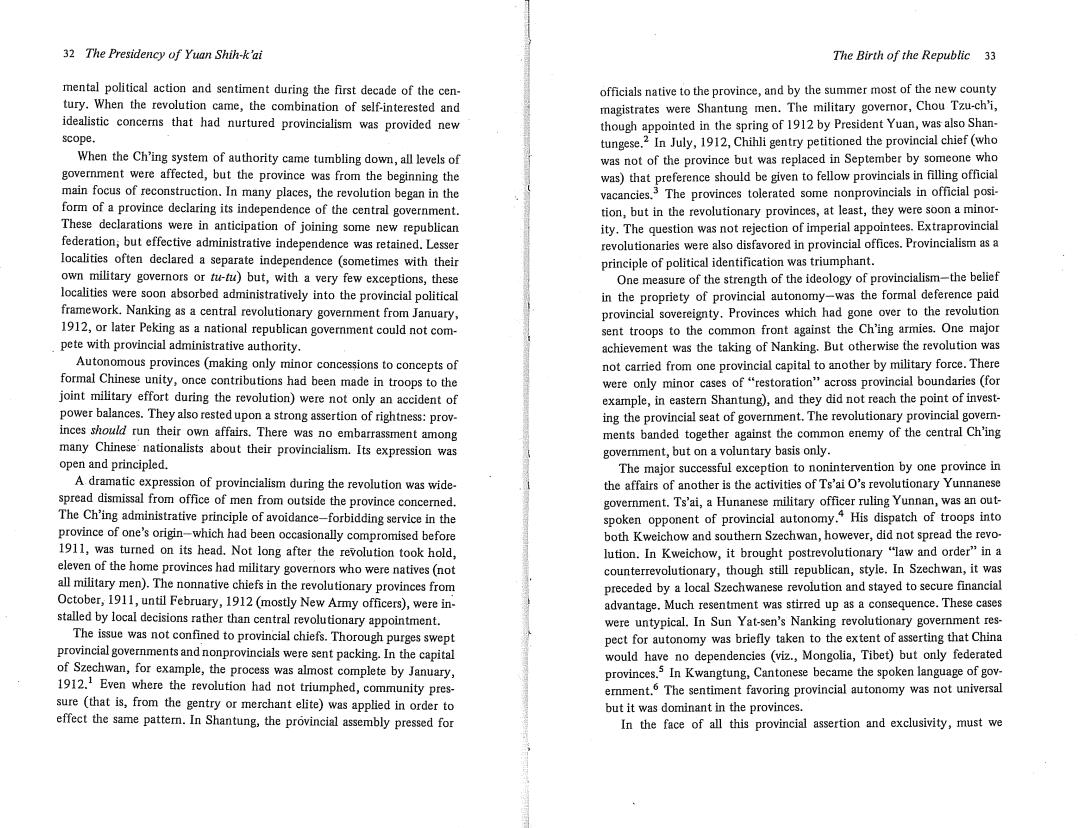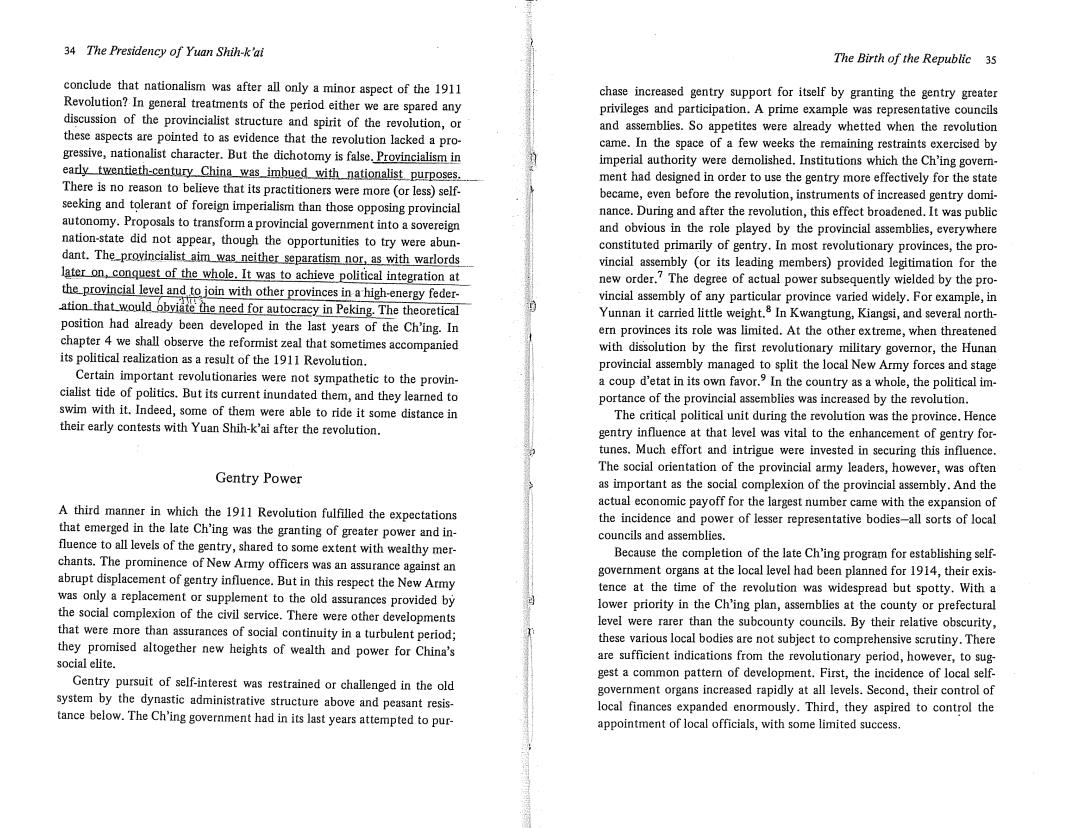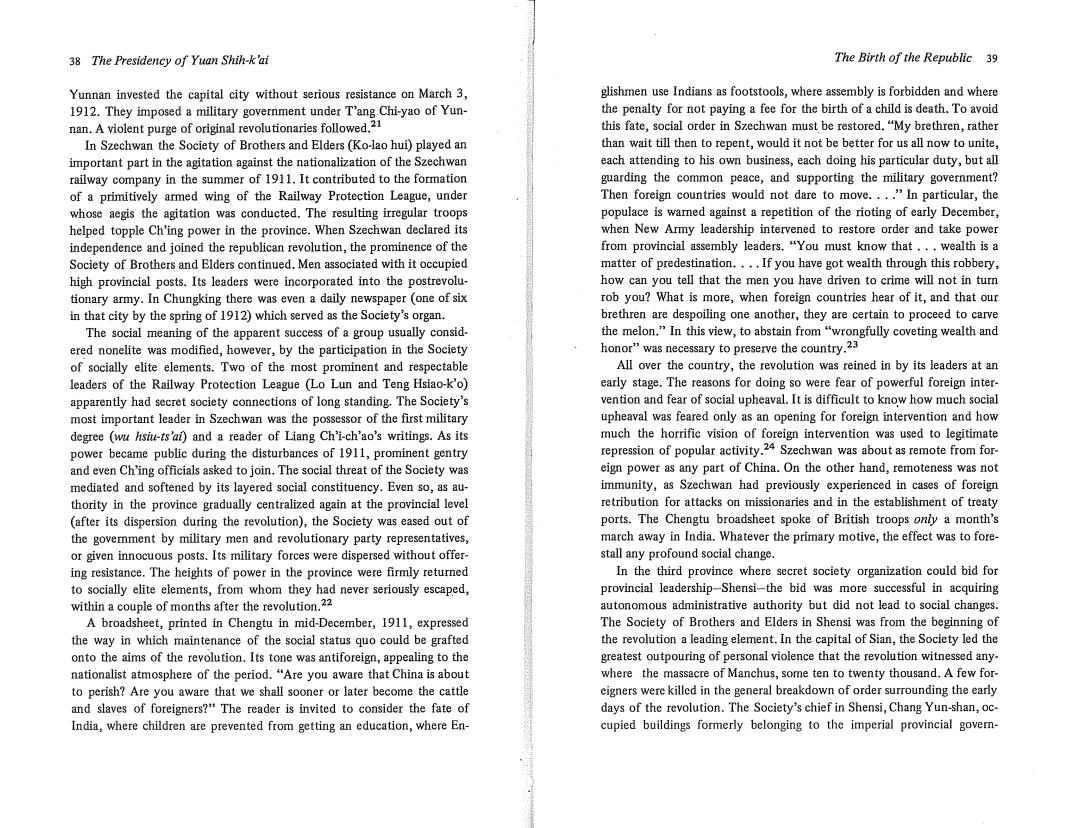
30 The Presidency of Yuan Shih-k'ai The Birth of the Republic 31 establishment of the first republican regime in Wuchang in October,to ments were an avenue to high civil positions.After 1900,the ultimate des- the triumph of revolutionary power in fourteen provinces,to the final ab. tination changed from civil rank to advancement in the military itself. dication of the Manchu monarch in February,1912.The excitement con- One trained to be an officer in the army to defend one'snation,whose pre 2 tinued into the first year of the republic.But retrospectively we can observe cariousness was generally recognized by the elite,and to participate in the that there was no major redirection of energies but rather a continuation dignity and perquisites of being an officer.Some of the ablest of the privi- of tendencies set in motion before the revolution leged youth,who in other eras would have sought civil position exclusively, The course of the revolution did serve to accentuate or underline some began to turn to a military career as a possible first choice.Aspiration to- of the themes of the last ten to fifteen years of the Ch'ing.Four in particu- ward positions in the civil government was still strong,of course,and other ae芯之reworthbrati恤theirotiypromnce of'笑g professions than the military had also entered the competition as elite the military,the political importance of the provincial unit,the growing careers-journalism,the law,political organization,business.The army and power of the gentry,and the continuing foreign encroachment on China's to a lesser extent the navy,however,for a time offered the greatest glory. sovereignty. Hence,officers were natural candidates for governorship. With its officers recruited heavily from the gentry,the New Army was in the social complexion of its leadership an appendage of the gentry class The Military (though like the old civil service,it might serve a variety of political func. tions,not always related to its social complexion).During the 1911 Revo- During the course of the revolution,military men assumed roles of broad lution and its immediate aftermath,the gentry concern for the mainten- leadership.In the first phase of seizure'of power,the New Army units in ance or reimposition of"law and order,"that is,the enforcement of the or near most provincial capitals were not just the possessors of the greatest social status quo,found its ultimate recourse in the modern military units. concentration of force but also the best organized centers of revolutionary Their performance as guardians of the social status quo(even as they were disposition.Outside northern areas near Peking,the New Army did not overturning the old political order)was,then,a further reason that mili- need to be won over to the revolution;elements from within it led or co- tary men exercised more than military leadership.In provinces where there operated with the revolution from the beginning.Especially in the last three was considerable mass violence (that is,not fully mediated by organiza- or four years before the revolution,as modern military units were organ- tions controlled by the elite),notably Szechwan,Shensi,and Kwangtung, ized in the provinces,the army was fertile ground for revolutionary ac- the socially repressive role of the New Army was particularly apparent.In tivity.(Even Peiyang units in north China were not exempt,though with any case,the title for provincial chief that became standard during the difficulty their disaffection was contained.)Military leadership came easily revolution-tu-tu-was a military one and in the majority of instances once the challenge to Manchu rule was under way.In the second phase of (eventually eleven out of fourteen)was held by a military man.The pre- consolidation within the provinces and of interprovincial coordination for dominance of civil officials in the provinces,eroded since the mid-nine- the projected assault on-remaining-Ch'ing authority,military tasks were teenth century,was overturned in the 1911 Revolution. primary:enlisting and training soldiers to resist and attack imperial forces. In the third phase of postrevolutionary republican rule,when military tasks were no longer primary,military men continued in most provinces to Provincialism in the Revolution lead.The reasons were more complicated than the sheer momentum of the power accumulated in the two previous phases,though this contributed. Another way in which the 1911 Revolution gave release and expression to Let us examine them. movements that had been building pressure in the preceding years was its The military profession had,in the years before the revolution,acquired giving vent to a boisterous provincialism.As described in the previous high prestige.In the latter half of the nineteenth century,military achieve- chapter,the provincial unit increasingly became a focus of nongovern-

32 The Presidency of Yuan Shih-k'ai The Birth of the Republic 33 mental political action and sentiment during the first decade of the cen- officials native to the province,and by the summer most of the new county tury.When the revolution came,the combination of self-interested and magistrates were Shantung men.The military governor,Chou Tzu-ch'i, idealistic concerns that had nurtured provincialism was provided new though appointed in the spring of 1912 by President Yuan,was also Shan- scope. tungese.2 In July,1912,Chihli gentry petitioned the provincial chief(who When the Ch'ing system of authority came tumbling down,all levels of was not of the province but was replaced in September by someone who government were affected,but the province was from the beginning the was)that preference should be given to fellow provincials in filling official main focus of reconstruction.In many places,the revolution began in the vacancies.3 The provinces tolerated some nonprovincials in official posi- form of a province declaring its independence of the central government. tion,but in the revolutionary provinces,at least,they were soon a minor- These declarations were in anticipation of joining some new republican ity.The question was not rejection of imperial appointees.Extraprovincial federation,but effective administrative independence was retained.Lesser revolutionaries were also disfavored in provincial offices.Provincialism as a localities often declared a separate independence (sometimes with their principle of political identification was triumphant. own military governors or tu-tu)but,with a very few exceptions,these One measure of the strength of the ideology of provincialism-the belief localities were soon absorbed administratively into the provincial political in the propriety of provincial autonomy-was the formal deference paid framework.Nanking as a central revolutionary government from January, provincial sovereignty.Provinces which had gone over to the revolution 1912,or later Peking as a national republican government could not com- sent troops to the common front against the Ch'ing armies.One major pete with provincial administrative authority. achievement was the taking of Nanking.But otherwise the revolution was Autonomous provinces(making only minor concessions to concepts of not carried from one provincial capital to another by military force.There formal Chinese unity,once contributions had been made in troops to the were only minor cases of "restoration"across provincial boundaries (for joint military effort during the revolution)were not only an accident of example,in eastern Shantung),and they did not reach the point of invest- power balances.They also rested upon a strong assertion of rightness:prov- ing the provincial seat of government.The revolutionary provincial govern- inces should run their own affairs.There was no embarrassment among ments banded together against the common enemy of the central Ch'ing many Chinese nationalists about their provincialism.Its expression was government,but on a voluntary basis only. open and principled. The major successful exception to nonintervention by one province in A dramatic expression of provincialism during the revolution was wide- the affairs of another is the activities of Ts'ai O's revolutionary Yunnanese spread dismissal from office of men from outside the province concerned. government.Ts'ai,a Hunanese military officer ruling Yunnan,was an out- The Ch'ing administrative principle of avoidance-forbidding service in the spoken opponent of provincial autonomy.His dispatch of troops into province of one's origin-which had been occasionally compromised before both Kweichow and southern Szechwan,however,did not spread the revo- 1911,was turned on its head.Not long after the revolution took hold, lution.In Kweichow,it brought postrevolutionary "law and order"in a eleven of the home provinces had military governors who were natives (not counterrevolutionary,though still republican,style.In Szechwan,it was all military men).The nonnative chiefs in the revolutionary provinces from preceded by a local Szechwanese revolution and stayed to secure financial October,1911,until February,1912(mostly New Army officers),were in- advantage.Much resentment was stirred up as a consequence.These cases stalled by local decisions rather than central revolutionary appointment. were untypical.In Sun Yat-sen's Nanking revolutionary government res- The issue was not confined to provincial chiefs.Thorough purges swept pect for autonomy was briefly taken to the extent of asserting that China provincial governments and nonprovincials were sent packing.In the capital would have no dependencies (viz.,Mongolia,Tibet)but only federated of Szechwan,for example,the process was almost complete by January, provinces.s In Kwangtung,Cantonese became the spoken language of gov- 1912.1 Even where the revolution had not triumphed,community pres- erment.6 The sentiment favoring provincial autonomy was not universal sure (that is,from the gentry or merchant elite)was applied in order to but it was dominant in the provinces. effect the same pattern.In Shantung,the provincial assembly pressed for In the face of all this provincial assertion and exclusivity,must we

34 The Presidency of Yuan Shih-k'ai The Birth of the Republic 35 conclude that nationalism was after all only a minor aspect of the 1911 Revolution?In general treatments of the period either we are spared any chase increased gentry support for itself by granting the gentry greater privileges and participation.A prime example was representative councils discussion of the provincialist structure and spirit of the revolution,or and assemblies.So appetites were already whetted when the revolution these aspects are pointed to as evidence that the revolution lacked a pro- came.In the space of a few weeks the remaining restraints exercised by gressive,nationalist character.But the dichotomy is false.Provincialism in imperial authority were demolished.Institutions which the Ch'ing govern- early twentieth-century China was imbued with nationalist purposes. ment had designed in order to use the gentry more effectively for the state There is no reason to believe that its practitioners were more (or less)self- became,even before the revolution,instruments of increased gentry domi- seeking and tolerant of foreign imperialism than those opposing provincial nance.During and after the revolution,this effect broadened.It was public autonomy.Proposals to transform a provincial government into a sovereign and obvious in the role played by the provincial assemblies,everywhere nation-state did not appear,though the opportunities to try were abun- constituted primarily of gentry.In most revolutionary provinces,the pro- dant.The_provincialist aim was neither separatism nor,as with warlords vincial assembly (or its leading members)provided legitimation for the later on,conquest of the whole.It was to achieve political integration at new order.?The degree of actual power subsequently wielded by the pro- the provincial level and to join with other provinces in a high-energy feder- vincial assembly of any particular province varied widely.For example,in ation that would obviate the need for autocracy in Peking.The theoretical Yunnan it carried little weight.In Kwangtung,Kiangsi,and several north- position had already been developed in the last years of the Ch'ing.In ern provinces its role was limited.At the other extreme,when threatened chapter 4 we shall observe the reformist zeal that sometimes accompanied with dissolution by the first revolutionary military governor,the Hunan its political realization as a result of the 1911 Revolution. provincial assembly managed to split the local New Army forces and stage Certain important revolutionaries were not sympathetic to the provin- a coup d'etat in its own favor.In the country as a whole,the political im- cialist tide of politics.But its current inundated them,and they learned to portance of the provincial assemblies was increased by the revolution. swim with it.Indeed,some of them were able to ride it some distance in The critical political unit during the revolution was the province.Hence their early contests with Yuan Shih-k'ai after the revolution. gentry influence at that level was vital to the enhancement of gentry for- tunes.Much effort and intrigue were invested in securing this influence. The social orientation of the provincial army leaders,however,was often Gentry Power as important as the social complexion of the provincial assembly.And the A third manner in which the 1911 Revolution fulfilled the expectations actual economic payoff for the largest number came with the expansion of that emerged in the late Ch'ing was the granting of greater power and in- the incidence and power of lesser representative bodies-all sorts of local councils and assemblies. fluence to all levels of the gentry,shared to some extent with wealthy mer- chants.The prominence of New Army officers was an assurance against an Because the completion of the late Ch'ing program for establishing self- abrupt displacement of gentry influence.But in this respect the New Army government organs at the local level had been planned for 1914,their exis- was only a replacement or supplement to the old assurances provided by tence at the time of the revolution was widespread but spotty.With a the social complexion of the civil service.There were other developments lower priority in the Ch'ing plan,assemblies at the county or prefectural that were more than assurances of social continuity in a turbulent period; level were rarer than the subcounty councils.By their relative obscurity, these various local bodies are not subject to comprehensive scrutiny.There they promised altogether new heights of wealth and power for China's social elite. are sufficient indications from the revolutionary period,however,to sug- gest a common pattern of development.First,the incidence of local self- Gentry pursuit of self-interest was restrained or challenged in the old government organs increased rapidly at all levels.Second,their control of system by the dynastic administrative structure above and peasant resis- tance below.The Ch'ing government had in its last years attempted to pur- local finances expanded enormously.Third,they aspired to control the appointment of local officials,with some limited success

36 The Presidency of Yuan Shih-k'ai The Birth of the Republic 37 In Hunan,for example,local self-government organs extended their ac- movement wherever it threatened to develop.They did so,and this is the tivity during the revolution in the collection of major fees and taxes,in- other side of the gentry triumph during the 1911 Revolution. cluding the land tax.In most major Hunanese cities,the duties of the In most provinces,a substantial independent movement of the non- prefect in the old administration were taken over by the local assem- elite-independent of socially elite leadership and control and therefore blies.10 As a reputed reform measure in Kwangsi,gentry participated in the socially threatening-did not occur.Peasants,rootless rural poor,and urban audit of the land tax,and other taxes formerly collected by officials were poor were recruited into the revolutionary provincial armies,amounting farmed out after the revolution to contractors or to local self-government in the country as a whole to hundreds of thousands.But,despite difficul- councils.11 In at least one county of Shantung where there had been no ties experienced in containing these mass armies,they did not turn in any revolutionary occupation,the magistrate came to be selected by the county determined way against their socially elite leadership.Mutinies occurred assembly.12 In postrevolutionary Chekiang,local self-government bodies and were rapidly put down.Banditry was widespread,particularly as the widely challenged the power of the county magistrates,who were not un- army recruits of the revolution were demobilized and frequently tumed to commonly elected locally in 1912 and 1913.13 County assemblies were in- local outlawry,whence some had come.But this too was either success- troduced in Kwangtung only with the revolution,and some acquired the fully suppressed or kept at a level that did not disturb the social order. power to choose their magistrate.14 Kweichow's first revolutionary gov- Sometimes the socially disruptive potential of the revolution was contained emment proposed and partially put into effect a system whereby a respect- preventively.This occurred in the case of the young returned student,Ting able gentryman,chosen by local groups,could veto the local application of Wen-chiang,in a Kiangsu rural area,recounted in the previous chapter;or provincial government orders.15 As a practical matter of finances and bu- in the case of the Hanlin compiler,Hsu Chao-wei,who upon Kiangsu's dec- reaucratic order,most provincial governments were not so solicitous.The laration of independence left Peking and helped form local militia(funded Yunnan government,in firm military hands at the provincial level,ex- by the local self-government assembly and officials)to suppress popular pressed outright hostility toward what it saw as usurpation of official func- movements against taxes and food shortages in his native Ch'ang-shou tions by local self-government bodies and their"evil gentry,"but,in parts county.18 Sometimes gentry-led militia regained control after lower class of the province where the army was absent,local gentry and the self- elements had temporarily seized power,as in Yenan in the northern prov- government councils probably augmented their power.16 In general this ince of Shensi.19 In other cases,where the local gentry seemed unable to remarkable flourishing of local representative bodies and their privileges reestablish the settled conditions whereby they were in charge,military was tolerated.The gentry surge was not easily turned back,and there forces attached to the provincial government were dispatched to redress seemed little desire in the governments of most revolutionary provinces to the balance.20 do so. In three provinces secret society organizations were major participants These advances in political power,with attendant economic benefits, in the new order,perhaps even contenders for province-wide leadership, secured at the expense of formal governmental authority,would have been but proved incapable of sustaining their power. worthless unless threats from below had been contained.To have reduced In Kweichow,a revolutionary provincial government was established in government controls coming from above would have profited the gentry early November,1911,with participation from a broad range of social nothing-indeed would have been a disastrous act of suicide-if they had classes.The dominant civilian leadership,drawn from the lower reaches of lost their elite status and their social control locally.There was consider- the gentry,had allied closely with secret societies in planning revolution able nonelite,popular activity during the revolution in some provinces. and relied on secret society muscle for its military strength after the revo- For us to ignore it would not do justice to the amount of turmoil nor to lution.A competing high gentry group,though participants,conspired the hint of the potential for more profound social change than occurred.17 against the new government and spoke in alarm about the breakdown of It was necessary for the gentry and their allies to contain or repress mass order.At the invitation of this second group,troops from neighboring

38 The Presidency of Yuan Shih-k'ai The Birth of the Republic 39 Yunnan invested the capital city without serious resistance on March 3, glishmen use Indians as footstools,where assembly is forbidden and where 1912.They imposed a military government under T'ang Chi-yao of Yun- the penalty for not paying a fee for the birth of a child is death.To avoid nan.A violent purge of original revolutionaries followed.21 this fate,social order in Szechwan must be restored."My brethren,rather In Szechwan the Society of Brothers and Elders(Ko-lao hui)played an than wait till then to repent,would it not be better for us all now to unite, important part in the agitation against the nationalization of the Szechwan each attending to his own business,each doing his particular duty,but all railway company in the summer of 1911.It contributed to the formation guarding the common peace,and supporting the military government? of a primitively armed wing of the Railway Protection League,under Then foreign countries would not dare to move...."In particular,the whose aegis the agitation was conducted.The resulting irregular troops populace is warned against a repetition of the rioting of early December, helped topple Ch'ing power in the province.When Szechwan declared its when New Army leadership intervened to restore order and take power independence and joined the republican revolution,the prominence of the from provincial assembly leaders."You must know that...wealth is a Society of Brothers and Elders continued.Men associated with it occupied matter of predestination....If you have got wealth through this robbery, high provincial posts.Its leaders were incorporated into the postrevolu- how can you tell that the men you have driven to crime will not in turn tionary army.In Chungking there was even a daily newspaper (one of six rob you?What is more,when foreign countries hear of it,and that our in that city by the spring of 1912)which served as the Society's organ. brethren are despoiling one another,they are certain to proceed to carve The social meaning of the apparent success of a group usually consid- the melon."In this view,to abstain from "wrongfully coveting wealth and ered nonelite was modified,however,by the participation in the Society honor"was necessary to preserve the country.23 of socially elite elements.Two of the most prominent and respectable All over the country,the revolution was reined in by its leaders at an leaders of the Railway Protection League(Lo Lun and Teng Hsiao-k'o) early stage.The reasons for doing so were fear of powerful foreign inter- apparently had secret society connections of long standing.The Society's vention and fear of social upheaval.It is difficult to know how much social most important leader in Szechwan was the possessor of the first military upheaval was feared only as an opening for foreign intervention and how degree (wu hsiu-ts'al)and a reader of Liang Ch'i-ch'ao's writings.As its much the horrific vision of foreign intervention was used to legitimate power became public during the disturbances of 1911,prominent gentry repression of popular activity.24 Szechwan was about as remote from for- and even Ch'ing officials asked to join.The social threat of the Society was eign power as any part of China.On the other hand,remoteness was not mediated and softened by its layered social constituency.Even so,as au- immunity,as Szechwan had previously experienced in cases of foreign thority in the province gradually centralized again at the provincial level retribution for attacks on missionaries and in the establishment of treaty (after its dispersion during the revolution),the Society was eased out of ports.The Chengtu broadsheet spoke of British troops only a month's the government by military men and revolutionary party representatives, march away in India.Whatever the primary motive,the effect was to fore- or given innocuous posts.Its military forces were dispersed without offer- stall any profound social change. ing resistance.The heights of power in the province were firmly returned In the third province where secret society organization could bid for to socially elite elements,from whom they had never seriously escaped, provincial leadership-Shensi-the bid was more successful in acquiring within a couple of months after the revolution.22 autonomous administrative authority but did not lead to social changes. A broadsheet,printed in Chengtu in mid-December,1911,expressed The Society of Brothers and Elders in Shensi was from the beginning of the way in which maintenance of the social status quo could be grafted the revolution a leading element.In the capital of Sian,the Society led the onto the aims of the revolution.Its tone was antiforeign,appealing to the greatest outpouring of personal violence that the revolution witnessed any- nationalist atmosphere of the period."Are you aware that China is about where the massacre of Manchus,some ten to twenty thousand.A few for- to perish?Are you aware that we shall sooner or later become the cattle eigners were killed in the general breakdown of order surrounding the early and slaves of foreigners?"The reader is invited to consider the fate of days of the revolution.The Society's chief in Shensi,Chang Yun-shan,oc- India,where children are prevented from getting an education,where En- cupied buildings formerly belonging to the imperial provincial govern-